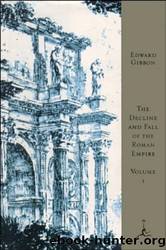The Decline and Fall of the Roman Empire, Volume I: A.D. 180 to A.D. 395 (A Modern Library E-Book): 001 by Edward Gibbon

Author:Edward Gibbon [Gibbon, Edward]
Language: eng
Format: epub
ISBN: 9780679641469
Publisher: Random House Publishing Group
Published: 2000-11-01T06:00:00+00:00
âThe master of the Roman world, who aspired to erect an eternal monument of the glories of his reign, could employ in the prosecution of that great work the wealth, the labour, and all that yet remained of the genius, of obedient millions.â
THE BASILICA OF CONSTANTINE OR MAXENTIUS (Illustration credit ill.10)
Notes for Chapter XVI
* * *
1 In Cyrene they massacred 220,000 Greeks; in Cyprus, 240,000; in Egypt, a very great multitude. Many of these unhappy victims were sawed asunder, according to a precedent to which David had given the sanction of his example. The victorious Jews devoured the flesh, licked up the blood, and twisted the entrails like a girdle round their bodies.
2 Without repeating the well-known narratives of Josephus, we may learn from Dion that in Hadrianâs war 580,000 Jews were cut off by the sword, besides an infinite number which perished by famine, by disease, and by fire.
3 The office of Patriarch was suppressed by Theodosius the younger.
4 We need only mention the purim, or deliverance of the Jews from the rage of Haman, which, till the reign of Theodosius, was celebrated with insolent triumph and riotous intemperance.
5 According to the false Josephus, Tsepho, the grandson of Esau, conducted into Italy the army of Ãneas, king of Carthage. Another colony of Idumæans, flying from the sword of David, took refuge in the dominions of Romulus. For these, or for other reasons of equal weight, the name of Edom was applied by the Jews to the Roman empire.
6 From the arguments of Celsus, as they are represented and refuted by Origen, we may clearly discover the distinction that was made between the Jewish people and the Christian sect.
7 It is difficult (says Plato) to attain, and dangerous to publish, the knowledge of the true God.
8 According to Justin Martyr, the dæmon, who had gained some imperfect knowledge of the prophecies, purposely contrived this resemblance, which might deter, though by different means, both the people and the philosophers from embracing the faith of Christ.
9 In the first and second books of Origen, Celsus treats the birth and character of our Saviour with the most impious contempt. The orator Libanius praises Porphyry and Julian for confuting the folly of a sect which styled a dead man of Palestine God, and the Son of God.
10 The emperor Trajan refused to incorporate a company of 150 firemen, for the use of the city of Nicomedia. He disliked all associations.
11 The proconsul Pliny had published a general edict against unlawful meetings. The prudence of the Christians suspended their Agapæ; but it was impossible for them to omit the exercise of public worship.
12 As the prophecies of the Antichrist, approaching conflagration, &c., provoked those Pagans whom they did not convert, they were mentioned with caution and reserve; and the Montanists were censured for disclosing too freely the dangerous secret.
13 In the persecution of Lyons, some Gentile slaves were compelled, by the fear of tortures, to accuse their Christian master. The church of Lyons, writing to their brethren of Asia, treat the horrid charge with proper indignation and contempt.
Download
This site does not store any files on its server. We only index and link to content provided by other sites. Please contact the content providers to delete copyright contents if any and email us, we'll remove relevant links or contents immediately.
The Daily Stoic by Holiday Ryan & Hanselman Stephen(2703)
The Fate of Rome: Climate, Disease, and the End of an Empire (The Princeton History of the Ancient World) by Kyle Harper(2429)
People of the Earth: An Introduction to World Prehistory by Dr. Brian Fagan & Nadia Durrani(2345)
Ancient Worlds by Michael Scott(2098)
Babylon's Ark by Lawrence Anthony(2066)
Foreign Devils on the Silk Road: The Search for the Lost Treasures of Central Asia by Peter Hopkirk(2053)
India's Ancient Past by R.S. Sharma(1982)
MOSES THE EGYPTIAN by Jan Assmann(1968)
The Complete Dead Sea Scrolls in English (7th Edition) (Penguin Classics) by Geza Vermes(1836)
Lost Technologies of Ancient Egypt by Christopher Dunn(1796)
The Daily Stoic by Ryan Holiday & Stephen Hanselman(1764)
The Earth Chronicles Handbook by Zecharia Sitchin(1742)
24 Hours in Ancient Rome by Philip Matyszak(1675)
Alexander the Great by Philip Freeman(1642)
Aztec by Gary Jennings(1540)
The Nine Waves of Creation by Carl Johan Calleman(1518)
Curse Tablets and Binding Spells from the Ancient World by Gager John G.;(1509)
Before Atlantis by Frank Joseph(1481)
Earthmare: The Lost Book of Wars by Cergat(1465)
